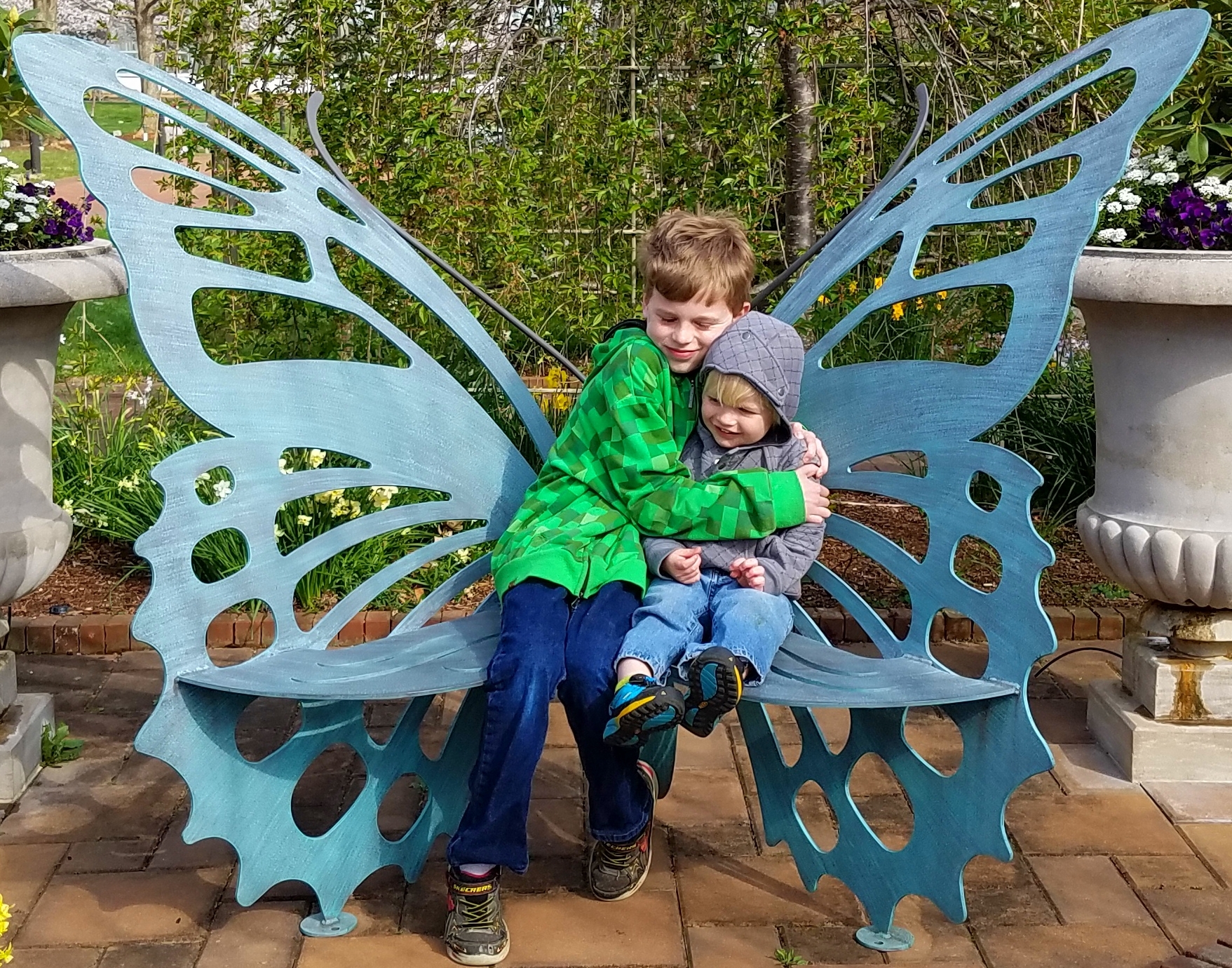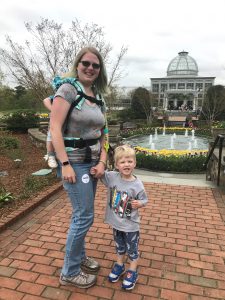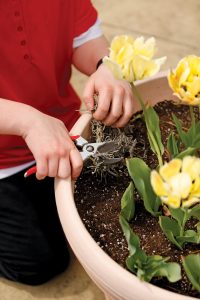The Power of the Garden: Therapeutic Horticulture
“Connor, come sit down with me!” A simple sentence perhaps, but for Jennifer Simmons, the words seemed miraculous. Three-year-old Parker had speech delays. He rarely spoke in complete sentences, and for months had been trying to say his brother’s name. Now he’d finally gotten it right.

Jennifer managed to capture this spontaneous, breakthrough moment as Connor hugged Parker on opening day of Butterflies LIVE! in 2018.
It was opening day of M&T Bank Butterflies LIVE! in the spring of 2018. Jennifer had brought Parker and 11-year-old Connor for a special after-school trip to Lewis Ginter. Parker especially loved the butterflies. “They’re so pretty-ful,” he’d say to his mother. That was one word Jennifer didn’t have the heart to correct.
Excited to be at the Garden, especially on the first day of Butterflies LIVE!, the boys began to race past the frog fountain towards the Conservatory. Parker was very pleased to be ahead of his older brother. He jumped up on a butterfly bench and called for Connor to join him. Connor did — and stunned his mother by reaching over to give his younger brother a hug.
“Mom, Parker did it! He’s mastered saying my name,” Connor called out.
At that moment one breakthrough became two. Connor is on the autism spectrum, and conventional ways of expressing affection don’t come easily to him. He might give someone a pat, Jennifer says, but not hug them. Until that day at the Garden when he squeezed his brother in a full-out hug.
It was a moment Jennifer will never forget.
We know gardens to be healing places. Humans respond to the natural world in universal ways. Our jangled nerves settle. Our senses engage in the sights, sounds, touch, and smells of nature — birdsong, running water, soil crumbling between our fingers, pungent herbs, a breeze glancing our faces. Being outdoors restores our bodies, minds, and spirits.
The Power of the Garden
Because of the innate therapeutic value of gardening and spending time in gardens, therapeutic horticulture emerged as a field of study and profession in the 1950s, although it had been practiced informally for many years. The American Horticultural Therapy Association defines therapeutic horticulture as the engagement of a person in the garden and plant-based activities, facilitated by a trained therapist, to achieve specific therapeutic goals. These goals can be cognitive/intellectual, social, physical or emotional/psychological.
Therapeutic horticulture can benefit anyone. It can be tailored to meet specific needs and help people gain a broad range of skills in language, communication or observation. Therapists often work with people with autism and those with speech difficulties, Parkinson’s disease, addiction, mental illness, or who may be recovering from a stroke. Working with horticultural therapists, clients can gain increased muscle tone, range of movement, motor skills, balance, and coordination. They can learn to work with others or independently.
Horticulture therapy helps people tap into their interests and enthusiasms. It encourages creativity and provides an outlet for stress and emotions. Tending plants and watching them grow over time can give people a sense of purpose and value. It can help them realize they are part of a larger picture. All this helps them gain confidence and self-esteem.
Benefits of Therapeutic Horticulture
For people with autism, who may have trouble communicating and interacting with others, or become upset by loud noises and bright lights, the calming effect of horticulture therapy can be especially beneficial. They can build confidence while helping things to grow and build social and communication skills by interacting with other people and plants.
Similarly, vocational training in a garden setting can be therapeutic to people on the spectrum or with other developmental disabilities, as they prepare for possible employment. Lewis Ginter provides vocational training to adults and youth from Faison Center, St. Joseph’s Villa and Northstar Career Academy, among others. Students work with plants, helping to tend seedlings in the Children’s Garden greenhouse, as well as gaining experience in the hospitality industry by working in the Garden Café.
As a leader in the therapeutic horticulture community, Lewis Ginter is collaborating with VCU’s School of Social Work, VCU’s Office of Continuing and Professional Education and others in the community to develop courses in therapeutic horticulture at the Garden. This program will train service providers on the benefits of horticulture therapy. Additionally, it will teach them how to incorporate it into their work with clients.
Positive Outcomes
For Jennifer Simmons, early intervention and in-home services such as speech therapy have helped her sons achieve tremendous progress in the past few years. She also credits their success to lots of time spent in the natural world. She takes her children outdoors every day and brings them to Lewis Ginter almost every week, driving all the way from Caroline County where they live.
“I find on days when we don’t go outside that they are absolutely bouncing off the walls,” Jennifer says, “It helps them sleep better, they get their energy out, and I love seeing them enjoy nature and learn and explore. It’s a big deal for us to get outside every single day.”

It’s a tradition! One year later, Jennifer, Parker and her youngest son Weston (in the backpack) visited Lewis Ginter on the opening day of Butterflies LIVE! in 2019.
When diagnosed on the autism spectrum at the age of two, Connor was completely nonverbal. Today, he’s almost at the top of his class in reading, excels in both math and spelling, and “has no problems with speech whatsoever,” Jennifer says, calling him a “completely different child than when diagnosed.” He no longer receives therapy.
Parker still works with a speech therapist. “He can have entire conversations with me now,” Jennifer said recently, “whereas a year ago he was just starting to string sentences together.” His speech therapist applauds Jennifer for taking Parker outdoors so often because it’s a great way to build language skills.
Being outdoors in the natural world together gives Jennifer and Parker lots to talk about. “I’m constantly pointing things out to him, giving him words for things like rocks and trees, asking questions,” she says. “We talk about where we should go on the trail and what we should do next.”
